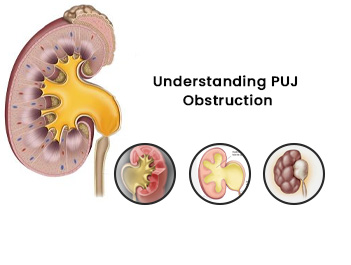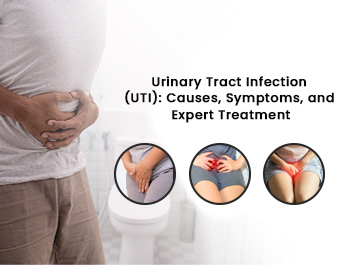
Understanding PUJ Obstruction

Introduction to PUJ Obstruction:
Pelvi-Ureteric Junction (PUJ) obstruction is a condition in which the flow of urine from the kidney to the ureter is blocked. This can occur at the point where the renal pelvis (the funnel-shaped cavity in the kidney) meets the ureter (the tube that carries urine from the kidney to the bladder). PUJ obstruction can cause urine to accumulate in the kidney, which may lead to pain, infection, and even kidney damage if not properly managed.
For anyone experiencing symptoms or at risk, it’s essential to seek timely diagnosis and treatment. Dr.Randhir Kumar, a leading urologist, specializes in PUJ obstruction Treatment in KPHB Hyderabad, offering a range of effective solutions.
At Anu Neurology and Urology Clinic, patients receive expert care for urinary tract obstructions, including PUJ obstruction, and can expect advanced diagnostic tests, personalized treatment plans, and compassionate care.
Symptoms of PUJ Obstruction
- Pain: Often felt in the lower abdomen or back, especially after urination.
- Frequent Urinary Tract Infections (UTIs): Due to urine retention in the kidney, infections can become common.
- Blood in Urine (Hematuria): The obstruction can cause damage to the urinary tract, leading to blood in the urine.
- Nausea and Vomiting: This can occur as a result of kidney damage and the accumulation of waste products in the bloodstream.
- Swelling in the Abdomen: Accumulated urine and fluid buildup can lead to visible swelling.
- Decreased Urinary Output: As the flow of urine is obstructed, patients may notice reduced urination.
Causes of PUJ Obstruction
- Congenital Factors: Many cases of PUJ obstruction are present from birth. These can result from abnormal development of the ureter or the renal pelvis during fetal development.
- Kidney Stones: A stone blocking the PUJ can cause a sudden obstruction. When a stone moves or becomes lodged in the ureter, it may lead to an acute obstruction.
- Scar Tissue (Fibrosis): Scarring can occur from previous infections, surgeries, or trauma, leading to the narrowing of the passage and the formation of a blockage.
- Tumors: In rare cases, tumors may develop around the PUJ, causing a blockage.
- Infections: Recurrent urinary tract infections or pyelonephritis can cause scarring and obstruction in the ureter.
- Inflammatory Conditions: Conditions like tuberculosis or other inflammatory diseases can affect the ureter, leading to narrowing or scarring of the PUJ.
Diagnosis of PUJ Obstruction:
To confirm PUJ obstruction, your doctor will conduct a thorough medical evaluation, which may include the following diagnostic procedures:
- Physical Examination: Your doctor will ask about your medical history, symptoms, and perform a physical exam to assess any signs of infection or swelling.
- Ultrasound: This imaging technique uses sound waves to create detailed images of the kidneys and ureters. An ultrasound can help detect any swelling, hydronephrosis (swelling of the kidney due to urine buildup), or stones.
- CT Scan: A more detailed imaging technique than ultrasound, a CT scan can help identify the location and extent of the obstruction, as well as any associated kidney damage or stone formation.
- Intravenous Urography (IVU): An X-ray examination of the urinary tract is performed after injecting a contrast dye into the bloodstream. It helps evaluate the structure and function of the urinary tract.
- MRI: In certain cases, MRI scans are used to get highly detailed images of the kidneys, ureters, and surrounding structures.
- Voiding Cystourethrogram (VCUG): This test can help assess how well the bladder and urethra are functioning by injecting a contrast dye into the bladder and observing the flow.
Treatment Options for PUJ Obstruction
PUJ obstruction Treatment in KPHB Hyderabad depends on the severity of the condition and the underlying cause of the obstruction. There are several approaches to treating this condition:
- Conservative Management In mild cases of PUJ obstruction where the kidney is functioning normally and there are no major complications, your doctor may suggest conservative management, which includes:
- Monitoring: Regular follow-up appointments to monitor kidney function and the progression of the obstruction.
- Antibiotics: If there is an infection, antibiotics may be prescribed to prevent or treat urinary tract infections.
- Endoscopic or Minimally Invasive Treatment For more moderate cases, endoscopic or minimally invasive treatments can be considered:
- Balloon Dilatation: A small balloon is inserted through a catheter and inflated at the site of the obstruction to open up the ureter and allow urine to flow freely.
- Stenting: A stent, a small tube, can be inserted to hold the ureter open, allowing urine to pass from the kidney to the bladder without obstruction.
- Surgical Treatment (Ureteroplasty)If the obstruction is severe or recurrent, surgery may be required to correct the problem. The two most common surgical procedures for PUJ obstruction are:
- Ureteroplasty: This procedure involves removing the obstructed segment of the ureter and rejoining the healthy ends, allowing normal urine flow.
- Pyeloplasty: This surgery is typically performed for congenital PUJ obstructions. It involves removing the narrowed area and reattaching the healthy parts of the renal pelvis and ureter.
Why Choose Dr.Randhir Kumar for PUJ Obstruction Treatment?
Dr.Randhir Kumar, a renowned urologist, specialized in PUJ obstruction treatment in KPHB Hyderabad and other complex urological conditions. He has vast experience in diagnosing and treating urinary tract obstructions using both conservative and surgical methods. Dr. Randhir Kumar’s expertise, combined with his compassionate approach, ensures that each patient receives the most effective treatment plan tailored to their specific needs.
At Anu Neurology and Urology Clinic, the team of experts uses state-of-the-art technology and provides personalized care to ensure the best outcomes for patients. Whether you require conservative management or advanced surgical intervention, you can trust Dr.Randhir Kumar and his team to offer the highest level of care.
Conclusion:
PUJ obstruction is a serious condition that requires timely diagnosis and treatment to prevent kidney damage and ensure proper urinary function. If you are experiencing symptoms of PUJ obstruction, it is crucial to seek medical attention promptly. Dr. Randhir Kumar at Anu Neurology and Urology Clinic, offers comprehensive care for urinary tract obstructions, including PUJ obstruction treatment in KPHB Hyderabad. With his expertise and the clinic’s advanced facilities, you can expect the best possible treatment options for your condition.
For expert care in PUJ obstruction and other urological concerns, contact Dr.Randhir Kumar today. Schedule your consultation at Anu Neurology and Urology Clinic for personalized and effective treatment.
Recent Posts


Common Signs of Neurological Disorders in Newborns

Understanding Different Types of Brain Strokes

Share:
Anu Neurology and Urology Clinic is proudly powered by WordPress